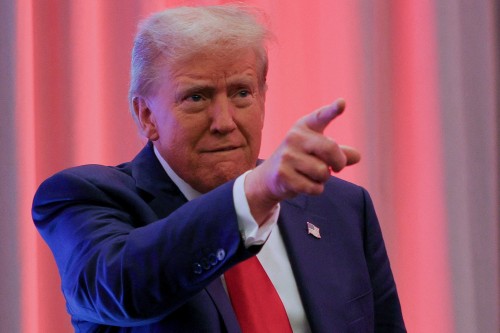By Andrew Chung
(Reuters) – U.S. Supreme Court Justice Samuel Alito faced calls from critics on Friday to step aside from cases related to the 2020 election after a media report that an American flag flew upside-down outside his Virginia home in the days before President Joe Biden’s inauguration in January 2021.
Alito told the New York Times that the flag had been placed by his wife, Martha-Ann Alito, after a dispute with a neighbor over a sign on the neighbor’s lawn that was critical of Republican then-President Donald Trump. The inverted U.S. flag became a symbol of protest by Trump supporters as he sought to overturn his loss to Biden with false claims of widespread voting fraud and a “stolen” election.
Democrat Dick Durbin, who chairs the Senate Judiciary Committee, said, “Flying an upside-down American flag – a symbol of the so-called ‘Stop the Steal’ movement – clearly creates the appearance of bias.”
Durbin said Alito should recuse from two cases currently pending before the Supreme Court that involve the 2020 election.
The first one is Trump’s bid for immunity from prosecution on federal criminal charges for trying to reverse his 2020 defeat. The second one case involves a challenge by a Pennsylvania man to a federal criminal charge of obstruction that he faces for his involvement in the Jan. 6, 2021, attack on the U.S. Capitol by Trump supporters. The case has implications for Trump, who faces the same charge in the election-related criminal case brought against him by Special Counsel Jack Smith.
“The court is in an ethical crisis of its own making, and Justice Alito and the rest of the court should be doing everything in their power to regain public trust,” Durbin said.
The Times reported that the upside-down flag flew at Alito’s house in Alexandria, Virginia on Jan. 17, 2021, not long after the Jan. 6 riot and days before Biden’s Jan. 20 inauguration. Word of the flag’s presence filtered back to the court, the newspaper reported.
Alito told the Times he had no involvement. “It was briefly placed by Mrs. Alito in response to a neighbor’s use of objectionable and personally insulting language on yard signs,” the Times quoted Alito as saying in a statement.
Alito elaborated on Friday, telling Fox News host Shannon Bream that his wife sought to address their neighbor’s anti-Trump sign that used an expletive and was close to a school bus stop. The neighbor then put up a sign “personally addressing Mrs. Alito and blaming her for the Jan. 6th attacks,” Bream wrote on social media.
Alito did not immediately respond to requests for comment on Friday.
David Rivkin Jr., an Alito supporter and appellate attorney whose clients include litigants in a tax case currently pending before the Supreme Court, called Durbin’s push for Alito’s recusal unfair and motivated by a desire for partisan gain.
“Since Justice Alito has indicated that he had nothing to do with the display of the flag, seeking his recusal is fundamentally wrong,” Rivkin said. “That Senator Durbin is doing so has nothing to do with ethics and is part of a politically driven, obsessive campaign against conservative justices only, with a lack of any interest in the behavior of liberal justices.”
Alicia Bannon, the director of the judiciary program at the New York University School of Law’s Brennan Center for Justice, said the flag display is more than “a clear ethics violation” as Alito has not apologized for or disavowed the upside-down flag.
“A Supreme Court justice appears to have embraced election denialism. That’s a five-alarm fire,” Bannon said.
The flag matter raises further questions about the ethical conduct of the justices at a time of increased scrutiny following revelations last year of undisclosed luxury trips and hobnobbing with wealthy benefactors.
Alito in June 2023 acknowledged taking a private jet to Alaska for a luxury fishing trip in 2008 but defended his failure to disclose the flight provided by a billionaire hedge fund manager whose business interests have come before the court.
The court last November adopted its first formal code of conduct governing the ethical behavior of its nine justices.
Alito last September rejected a push to have him recuse himself from the tax case involving Rivkin, who interviewed the justice for a newspaper article that Durbin and other Senate Democrats said helped Alito “air his personal grievances.”
(Reporting by Andrew Chung in New York; Additional reporting by John Kruzel in Washington; Editing by Will Dunham)



